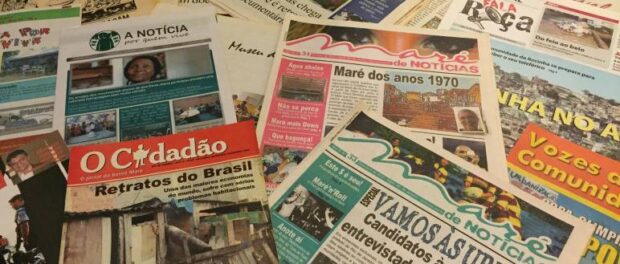
The traditional media, which hold the largest audiences across media channels, differ from democratic forms of communication because they are beholden to large corporations. Their social, moral and historic intentions are different. Political interests dominate when the media require access to public concession of the country’s radio and TV licenses, making effective democracy difficult and increasing the need to produce alternative communication.
Community communication currently occurs on social networks, news portals, printed newspapers, popular courses, community radio stations legal or not, web radio and in discussions on various topics. These and other forms of public service, of sharing information, and of policy formation occur in a horizontal fashion through the initiative of residents, collectives, organizations and local institutions.
With access to technology, any citizen with a certain level of technology does not only receive information, but produces and shares it. Community communicator from the Viva Rocinha portal Michel Silva, 20, is an example of a resident who feels the need to learn through community journalism and to solve problems through writing. “The content of community media is an important instrument of local documentation. Residents become aware of works, social projects and stories,” he affirms. This type of journalism has challenges, mainly “the lack of financing which is a big difficulty, on top of the absence of responses from government agencies,” he concludes.

The importance of democratization is connected to freedom of expression and the right that every citizen has to consume, produce and share information. But there is no interest in supporting this on the part of public officials. According to the study Right to Communication and Racial Justice, there currently aren’t public policies or funded programs aimed to stimulate alternative communication in Brazil. As can be seen, the President’s Social Communication Secretariat (SECOM) concentrates 70% of funds from the federal government on advertising with just ten media outlets.
The Argentinian journalist Nacho Lemus, 31, lives in Rio de Janeiro and told of how the subject is treated abroad. “For the global mass media, the poor in Brazil are an object of consumption. The treatment is cynical. For those who deal in information, the favela is what the Amazonian wilderness was for decades. The population is involved in a show of violence, narco-trafficking and drug consumption. This catches the attention of international media to denounce social inequalities,” says Nacho, who has come to better understand how community communication is created by reaching out to media outlets in places like Complexo da Maré.
The National Forum for the Democratization of Communication is a social movement that works to mobilize all those involved with communication in Brazil. For 20 years they’ve fought and won national campaigns such as the reform of the Press Law and the creation of the National Congress Media Council.
In this Olympic year in Rio de Janeiro, the alternative media is already alert for events involving favelas, spaces of greater concern to the authorities, as well as traditional vehicles that are increasingly seeking residents to give their opinions on promises and projects. The Olympic spirit has not arrived. But the need to communicate in our own words what really happens remains year after year.
Thaís Cavalcante is a 21-year-old community journalist, born and raised in Nova Holanda, one of the favelas in Complexo da Maré. Working as a community reporter over the past 4 years in her community, Thaís decided to study journalism at university and believes in the power of information to change our reality.
